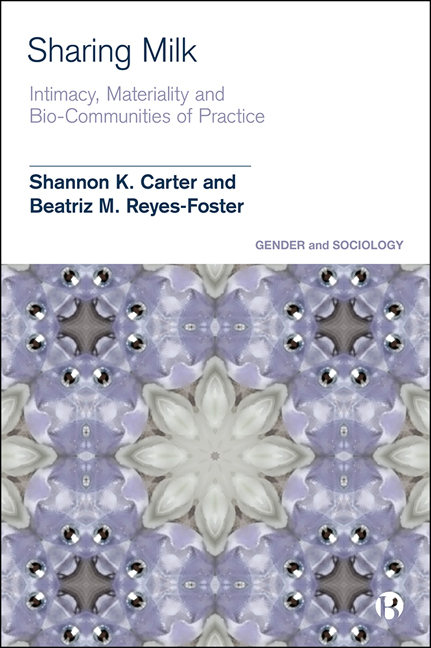Book contents
- Frontmatter
- Dedication
- Contents
- List of Figures and Tables
- Notes on the Authors
- Acknowledgements
- Preface
- 1 Introduction: Sharing Milk
- 2 Theorizing Milk Sharing
- 3 Entering Bio-Communities of Practice
- 4 Milk-Sharing Practices
- 5 The Milk-Sharing Network
- 6 Conclusion
- Notes
- Appendix A Survey Participant Demographics
- Appendix B Interview Participant Demographics
- References
- Index
1 - Introduction: Sharing Milk
Published online by Cambridge University Press: 10 March 2021
- Frontmatter
- Dedication
- Contents
- List of Figures and Tables
- Notes on the Authors
- Acknowledgements
- Preface
- 1 Introduction: Sharing Milk
- 2 Theorizing Milk Sharing
- 3 Entering Bio-Communities of Practice
- 4 Milk-Sharing Practices
- 5 The Milk-Sharing Network
- 6 Conclusion
- Notes
- Appendix A Survey Participant Demographics
- Appendix B Interview Participant Demographics
- References
- Index
Summary
In a time where breastfeeding has re-emerged as the most widely promoted method of infant feeding, a distinct form of sharing breastmilk has emerged in the United States (US) and other postindustrialized societies in the Global North. Parents and other caretakers who are unable to provide sufficient breastmilk themselves are increasingly turning to peers to acquire human milk for their babies. They meet these peers through a combination of online and offline social networks, and form communities with distinct spoken and unspoken rules about how milk sharing takes place. These communities are reflective of emerging socialities made possible by 21st-century advances in technology, new forms of communication, and changing understandings of the human body and its products.
This is a book that analyzes human milk-sharing communities in a large metropolitan area in southeastern US. We have engaged with milk-sharing communities for several years, at times becoming part of them, in our endeavour to understand how these practices are reflective of new and changing ways of establishing and maintaining social connectedness. We describe the practices of milk sharing, the meanings ascribed to human milk, and the labour involved in its production. We build on existing scholarship and theoretical frameworks to develop a model for understanding contemporary forms of bodily sharing.
The feeding of human milk to socially and biologically unrelated infants is not, by any means, a new phenomenon. Rather, it is a normal method of infant feeding documented throughout human history, in societies around the world, and across mammalian species. Nevertheless, Euroamerican values of individualism, the heteropatriarchal nuclear family, and dominant gender roles have generated expectations that mothers throughout the Global North – particularly those who are white, middle-class, heterosexual and cisgender – are individually responsible for feeding their own, and only their own, infants (Shaw 2007, 2015, 2019; Carroll 2014; Palmquist 2015; Falls 2017; Shaw and Morgan 2017; Wilson 2018). This mandate emerges within a broader set of expectations that Sharon Hays (1996) calls ‘intensive mothering’, in which mothers are expected to maintain individual responsibility for their children's health and wellbeing, consult and follow expert guidance on parenting matters, expend vast time and resources into parenting, and prioritize their children's needs above their own.
- Type
- Chapter
- Information
- Sharing MilkIntimacy, Materiality and Bio-Communities of Practice, pp. 1 - 34Publisher: Bristol University PressPrint publication year: 2020



